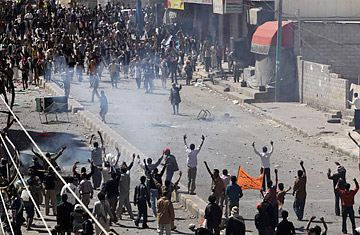
Antigovernment protesters (with their backs to the camera) face off against government backers during clashes in Sana'a, Yemen, on Feb. 17, 2011
(3 of 3)
In an interview with TIME earlier this week, prominent female activist Tawakul Karman said the revolutions in Tunisia and Egypt have changed the political landscape in Yemen and energized the youth that make up the majority of Sana'a's opposition demonstrators. "They hope that each one of them can become another Wael Ghonim," Karman said, referring to the opposition activist who became a symbol of the successful protest in Egypt. "Everyone is ready to be more than a hero for their homelands — they're ready to be martyrs."
More than 1,000 people answered her call to hold the capital's first nighttime demonstration on Thursday. This time, loyalists and the opposition rallied side by side, chanting slogans and even dancing. It appeared that the event would continue peacefully.
But suddenly, government supporters attacked Karman, who escaped in a car as bottles and chunks of concrete were thrown at her. Again fighting broke out, leaving many seriously injured. According to local human-rights watchdog HOOD, more than 100 were injured over the course of the day.
These recent escalations are unlikely to deter activists in the capital in coming days. Nor are they expected to push Saleh to resign. But an extended period of violence could prove devastating to the country — Yemen boasts the second highest rate of per capita gun ownership, behind only the U.S., according to the 2007 Small Arms Survey.
Still, antiregime protesters vow they will keep taking to the streets. Yemen is the poorest country in the Arab world, with nearly half of its 23 million inhabitants illiterate and 35% unemployed. "We want to build freedom like in the U.S. and Europe," said Shukri al-Shaibani, a 35-year-old orthopedic-surgery resident at the demonstration Thursday night. "We want to build our economy and create opportunities."
On Thursday, influential Sheik Abdul-Majid al-Zindani, a longtime ally of President Saleh who has been labeled a terrorist by the U.S. government, attempted to ease tensions by calling for a unity government that would include opposition members and hold elections in six months. But the move appeared to have little effect on Friday's demonstrators, who shortened their chants to a single word: "Leave."
